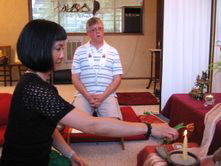Mon, 14 September 2009
|
Sun, 24 May 2009
Tracked version includes the following detail: 1. Lineage of material on Mind; Yeshe Gyaltsen’s ‘Necklace of Clear Understanding’; Sangharakshita’s ‘Know Your Mind’; Subhuti’s talks on ‘Mind and Mental Events’ 2. The Abhidharma – classification of mental events; transforming mental states and actions; sharing and confessing 3. What is ‘Mind’? Introspection – Dharma-Vichaya (dhammaviccaya); the seven ‘Limbs of Enlightenment’ (Bodhyangas); reflecting on the lakshanas and Pratitya Samutpada 4. Practical aids in working with mental events; different Abhidharma traditions; lists as tools 5. Defining and experiencing Mind; manas (state of consciousness); impossible to pin down; Milarepa and the Shepherd’s Search for Mind; mind and the subjective 6. Subjective versus objective; the Yogachara perspective; the skandhas and vijnana; the Enlightened person and non-identification with the subjective) 7. The eight vijnanas and the five Wisdoms or Jinas; Yeshe Gyaltsen’s focus on the senses 8. Characteristics of mind – i. clarity ii. cognition iii. momentary iv. conditioned v. karma 9. Primary Mind (chitta, citta); mental events as how the mind takes hold of objects; experiencing ‘Pure Mind’ through prajna; Milarepa’s list of requirements 10. A Look at the 51 mental events; six categories and two perspectives 11. Summary – transforming mental states; Padmasambhava on Mind Talk given at Wymondham, 2001 To help us keep this free, please think about making a donation. |
Fri, 30 January 2009
As a basis Dhammarati looks at the FWBO’s own grounding in tradition, and encourages us all at root to look continually to our own practice as we make the great journey from suffering to an expansive sense of living free. Talk given at the Birmingham Buddhist Centre, January 2009 |
Free Buddhist Audio

Categories
DharmabytesFree Buddhist Audio
Podcasts
Buddhism
FBA Podcast
Archives
AprilMarch
February
January
December
November
October
September
August
July
June
May
April
March
February
January
December
November
October
September
August
July
June
May
April
March
February
January
December
November
October
September
August
July
June
May
April
March
February
January
December
November
October
September
August
July
June
May
April
March
February
January
December
November
October
September
August
July
June
May
April
March
February
January
December
November
June
May
April
March
February
January
December
August
June
April
February
January
December
October
July
June
May
April
March
February
January
December
November
October
September
August
July
June
May
April
March
February
January
December
November
October
September
August
July
June
May
April
March
February
January
December
November
October
September
August
July
June
May
April
March
February
January
December
November
October
September
August
July
June
May
April
March
February
January
December
November
October
September
August
July
June
May
April
March
February
January
December
November
October
September
August
June
May
September
May
January
September
June
May
January
December
November
September
July
June
April
February
January
December
November
October
September
July
May
April
March
February
January
November
September
August
July
| S | M | T | W | T | F | S |
|---|---|---|---|---|---|---|
| 1 | 2 | 3 | 4 | |||
| 5 | 6 | 7 | 8 | 9 | 10 | 11 |
| 12 | 13 | 14 | 15 | 16 | 17 | 18 |
| 19 | 20 | 21 | 22 | 23 | 24 | 25 |
| 26 | 27 | 28 | 29 | 30 | ||
Syndication




